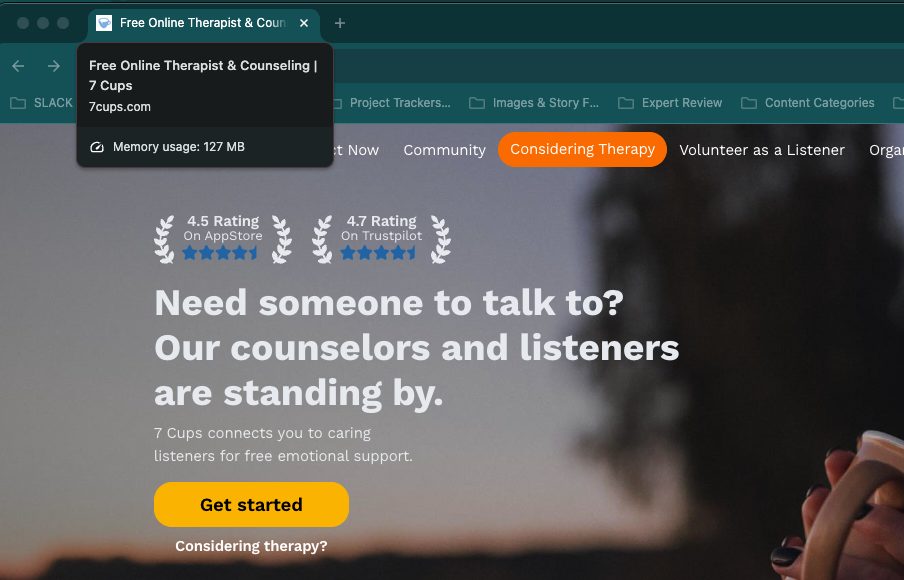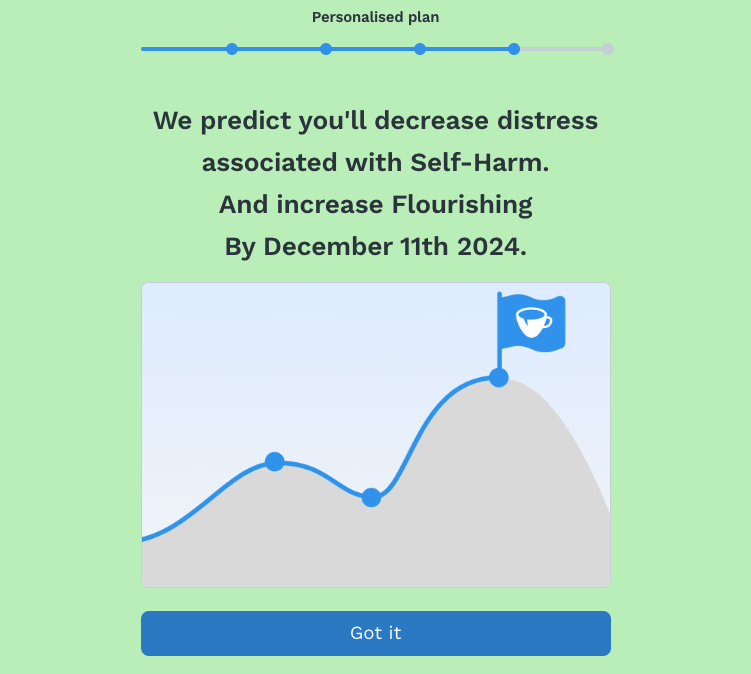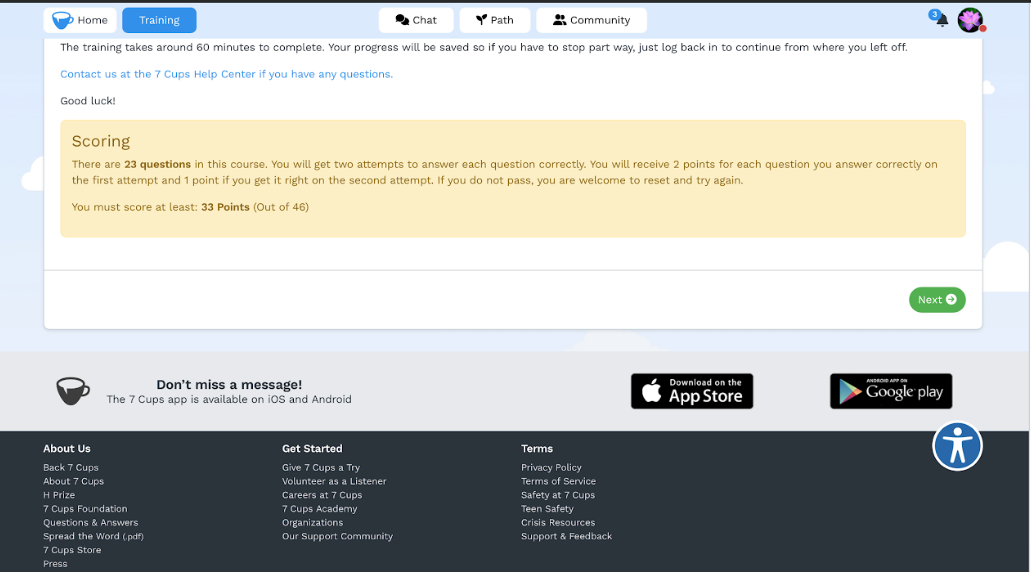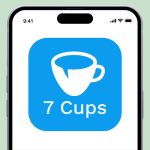Table of Contents
- The Handbook Team has spent over 10,000 hours researching more than 70 online therapy platforms. We identified the top 26 platforms and personally tested each one.
- We regularly facilitate focus groups and run surveys to understand the online therapy experience firsthand. To date, we have surveyed more than 2,000 online therapy users.
- Our 7 Cups testers signed up for the platform, evaluated its services, and even signed up to become a 7 Cups “listener.”
- Learn more about how we tested 7 Cups online therapy.
Key takeaways
- 7 Cups may be helpful as a social platform, but we do not recommend it for therapy or mental health support.
- The free 24/7 emotional support chat feature on 7 Cups is staffed by untrained volunteers, not mental health care professionals.
- 7 Cups offers free user-to-user, group, and listener chats; therapy services start at $159 per month. 7 Cups does not take insurance.
- An alternative to 7 Cups is BetterHelp, which offers messaging and video therapy for about $65–$90 per week.
The 7 Cups mental health platform provides professional therapy with licensed therapists for a monthly fee, and a social platform where users can find free peer-to-peer online chat support. It also advertises personalized care plans. Although 7 Cups offers online therapy and some free services, our comprehensive review of the platform raised a number of red flags about the quality of support provided to its users.
In this review, our Handbook Team shares our testers’ experience with the 7 Cups platform, including how much they paid for the service and why it did not make our best online therapy list.
BetterHelp: Best Alternative to 7 Cups for Online Therapy
According to our research and testing, BetterHelp offers more robust therapy services than 7 Cups, and at a more affordable price. We also prefer BetterHelp because their licensed mental health professionals deliver all of the services. Compare this to 7 Cups, which has unlicensed volunteers providing its free chat support.
7 Cups online therapy highlights
Our experience with 7 Cups
After researching more than 70 therapy platforms, our Handbook Team knows that affordable therapy can be hard to find. 7 Cups advertises the promise of free online therapy.
However, our testing of the free services offered on 7 Cups found that they are not provided by licensed therapists. While 7 Cups does offer text and live audio and video sessions with licensed therapists, those services are only available through a paid monthly subscription.
The free 7 Cups emotional support chat service connects users with “active listeners.” These are insufficiently vetted, untrained volunteers with little to no experience providing mental health care or advice. In fact, one of our testers was able to become a listener by taking a simple, 23-question test.
Our testers were also unimpressed by the website’s interface, which they say feels clunky, outdated, and difficult to navigate. While using the free chat support services, they were inundated with prompts to start a paid therapy plan.
Who may like 7 Cups: People who want to connect with others and looking for an alternative to social feeds like Facebook or Instagram may appreciate the communal features of this platform.
Who may want to avoid 7 Cups: People seeking help for mental health challenges like anxiety, depression, or trauma should steer clear of 7 Cups, as not all of its services are delivered by licensed mental health professionals.
From our 7 Cups tester:
“I do find the whole platform confusing. It’s very busy and cluttered with so many options and groups to join … I was constantly exposed to marketing messages.”
What is 7 Cups online therapy
7 Cups is an online therapy and emotional support platform. The brand’s tagline, which comes up when you search for “free online therapy,” claims to provide “Free Online Therapist & Counseling,” but this is a misleading claim. While 7 Cups does offer free online chat groups and free peer-to-peer chats with listeners, the listeners are not trained, licensed, or credentialed in mental health care. Anyone can sign up to be a listener by taking a 23-question test (unlimited retakes are offered to those who fail), and from our experience, the test questions did not inspire confidence in the vetting process.
Paid subscription plans with licensed therapists are available, with the lowest cost starting at $159 per month for live messaging therapy.

The 7 Cups experience includes self-guided features that are aimed at promoting personal growth and self-exploration. Their “Learn, Explore, Grow” model assigns users daily tasks. For example, one day one of our testers was asked to complete a one-minute training on social media comparison (Learn), go to a 7 Cups social feed and like a post (Explore), and report how many hours of sleep they got the night before (Grow).
“Because I completed all of today’s tasks, my tea cup icon for today now shows full,” our tester notes. “The dashboard shows a cup for each day of the week, thus ‘7 Cups.’”
In other online therapy platforms we’ve tested, like Brightside, interactive features like these are usually a complement to the therapy and come with a paid subscription plan. While the “Learn, Explore, Grow” activities on 7 Cups have the potential to be helpful, users should not view these types of tasks as suitable replacements for talking to a certified therapist with clinical experience.
How does 7 Cups work?
The 7 Cups platform, available on desktop or mobile app, offers a combination of services to its users. The most prominent and accessible feature is the free group chats. You can also have private one-on-one chats with untrained volunteer listeners, or with Noni, the 7 Cups AI chatbot, also available as a free service.
With a paid monthly subscription, users can sign up to engage in one-to-one therapy with a licensed mental health care provider.
From our 7 Cups tester:
“The site is set up much like a social media site, like Facebook, with a feed where you can comment on or like posts. While navigating the site you are often encouraged to join groups, chat with a listener, and connect with a therapist. You must pay to chat with a therapist, while all other chatting is free. It does feel like you are constantly being directed to fee-based services.”
Signing up for 7 Cups online emotional support and therapy
Interested users can start by clicking the “Get Started” button on the website’s main page. From there, you’ll be guided through a series of questions about various aspects of your life, including relationship status, location, religious identity, gender identity, and the reason you’re signing up. It took our testers about 30 minutes to create their 7 Cups accounts.
After this, you’ll enter the “Exploring Your Issues” section of the sign-up, which asks you to identify specific mental health issues you may be facing, such as anxiety, depression, loneliness, or self-esteem. You’ll be asked to choose from a variety of services that interest you, from chat support services to virtual therapy. At the end of the sign-up process, you’ll receive a personalized plan (created by the site’s algorithm, not a person), which includes a predicted date by which you will feel better.
One of our tester’s primary complaints about the process is its promise that you will feel better, or at least less distressed, by a specific date. In the course of evaluating the appropriateness of the guidance provided by the service, our testers entered “self harm” as a mental health issue. Although our tester wasn’t actually experiencing the compulsion to self-harm, they chose this option to evaluate how the site responds to such a serious issue.
Our Handbook Team found it very concerning that the tester was promised “decreased distress” within three months, even though they did not sign up for a paid therapy plan. When we asked one mental health expert about this finding, they described it as “clinically alarming.”

Free online chat options
Professional therapy is not free with 7 Cups, but it is free to chat with other users, volunteer listeners, or with the 7 Cups AI chatbot, Noni. Here’s an overview of our testers’ experiences in each of these online spaces:
- Group chats: Users can find invitations to group chats in their social feed. For example, one of our testers was invited to join a “Sharing Circle” group, which they described as “just chatty, with no one discussing mental health or problems.”
In the community calendar, you can find dates for support group chats on specific topics, like anxiety support or goal-setting. While our tester reports that they didn’t find any of the group chats to be particularly enriching or helpful, they did note that participants were generally respectful and supportive of each other.
- Chatting with an AI chatbot: Whether AI-led mental health support will be an effective option for mental health support is still being studied. If you are curious about this new technology and want to try it for yourself, 7 Cups offers Noni, its artificial intelligence “presence.” It is a good idea to proceed with caution when using AI chatbots and know that they are never a replacement for therapy with a mental health professional.

During their chat with Noni, our tester didn’t see any ads, which they appreciated. After sharing their conflict with Noni, the bot guided them through a process of weighing pros and cons to help them make a decision. This type of outside perspective could be helpful for some users.
While this response was not in any way harmful to our tester, we have concerns about the potential for a chatbot to deliver unhelpful or even harmful advice. A 2023 review of chatbot-based mobile mental health apps found that even recently developed chatbots can fail to properly identify a mental health crisis.
- Chatting with a volunteer listener: People with a free 7 Cups account can have one-on-one live chats with one of the platform’s volunteer listeners. While the website allows you to browse through a list of listeners, it doesn’t actually let you choose which listener you want to match with, an aspect of the platform our tester found confusing.
Our tester tried three different times to connect with a listener and had to wait each time. On their third try, the tester finally got through to a listener after waiting for more than five minutes. Our tester then shared the same conflict issue with the human listener that they’d shared with the AI chatbot. The listener gave our tester direct advice about how to proceed, which is against the guidelines in the listener training.
From our 7 Cups tester:
“I asked the volunteer listener for advice on a made-up scenario to see what they would say. They actually told me what they thought I should do, which I know is a big no-no from my listener training.”
Becoming a 7 Cups volunteer listener
One of our testers signed up to be a 7 Cups volunteer listener by taking the required test. Anyone can become a listener by taking a 23-question test, as long as they score 33 or more points out of 46. People who fail the test can take it again.

The 7 Cups platform does implement some strategies for volunteer listeners, such as listener coaching (by other listeners), feedback, and a clear set of community guidelines. There’s also an anonymous evaluation program where other listeners can “mystery shop” a listener’s performance and report any violations of community guidelines.
“If a listener were acting inappropriately or harming users, it appears they would be caught eventually,” our tester says. But it’s hard to say how long that could take. The training for volunteer listeners is only 60 minutes long, which feels too short to prepare someone to support the mental health of others.
Our final take on the 7 Cups chat experience
Some people may find the simple support-group-style chat to be useful as a way to engage with others socially, but the overall lack of oversight our testers found in each of the 7 Cups chat options raises some red flags for our team. Listeners are minimally trained and, as evidenced by our tester’s experience, may behave in ways contrary to the training they received. And because group chats and one-to-one listener chats are not supervised by licensed mental health care professionals, we do not recommend them for anyone seeking mental health treatment or support.
Therapy options
Although 7 Cups advertises free online therapy, you have to sign up for a paid subscription to make an appointment with a licensed mental health care provider. You’ll be given the option to sign up for therapy early in the sign-up process, and if you attend any online group chats, you’ll receive invitations to “upgrade to therapy.”
If you do choose to sign up for therapy, you’ll be guided through a list of questions about what you prefer in a therapist (more or less structure in sessions, for example). Then, the platform will match you with a therapist.
The basic 7 Cups therapy subscription includes live chat therapy with a licensed therapist. These can be scheduled one to two times per day (weekdays only) and availability will depend on your therapist. You can also send a message to your therapist at any time and they will respond when they check their messages. Once you’re signed up for the text therapy plan, you can add on weekly video sessions for an additional fee. Subscriptions can be canceled at any time.
While 7 Cups therapists appear to be licensed, certified professionals, we are concerned enough with the lack of transparency and oversight exhibited by this platform’s chat features that we don’t recommend them for text therapy, either. People seeking therapy for anxiety disorders, depression, or other mental health challenges who need an online option should consider other platforms we’ve tested and reviewed, such as BetterHelp or Brightside.
Additional features
People with a free or paid 7 Cups account also have access to the following features:
- Mini-trainings on topics like social media comparison or self-esteem.
- Self-help guides on topics like panic attacks, grief, and social anxiety.
- Social feed for connecting with other 7 Cups users.
How much does 7 Cups cost?
7 Cups online therapy is not free. Rather, it is available through a paid subscription plan. Here’s how 7 Cups pricing works:
- Live chat with a therapist one to two times per day (weekdays only) and message them any time for $159 per month.
- Add weekly video meetings (45-minutes each) with your therapist for an additional $140 per month.
- Live video sessions are only available to users who are already on the basic paid text therapy plan at $159 per month. If you want your therapy experience to include live, weekly video sessions, the total cost is $299 per month.
- Subscriptions are charged monthly.
Our experience with 7 Cups customer service
7 Cups customer service can be reached through the following contacts.
- Phone: 844-755-8757
- Email: [email protected]
From the website, there is no obvious way to get in touch with customer service. We were able to find the 7 Cups customer service phone number and email contacts by performing an online search off the site.
We tried calling the customer service line twice during normal business hours (10:00 a.m. to 7:00 p.m. EST), but were sent to a voicemail service. The recording encourages callers to leave a message but also says that email is a quicker way to get a response. We left a voice message and sent an email. We did receive a helpful email response within 24 hours, but we did not get a call back from the customer service line.
In a mental health emergency
Online therapy may not be the most appropriate resource to help in a mental health crisis. If you or someone you know is a danger to themselves or others, it is an emergency and cannot wait for an online therapist’s response. Don’t wait. You can find help immediately by:
- Calling 911.
- Visiting your local urgent care or emergency room.
- Calling or texting 988 for the Suicide & Crisis Lifeline.
- Chatting online at 988lifeline.org.
- Calling the Substance Abuse and Mental Health Services Administration (SAMHSA)’s Helpline at 1-800-662-4357 or texting your zip code to 435748.
All the above options will connect you with trained professionals who can provide crisis support. You can find even more resources, including international options, on our helpline directory page.
Our 7 Cups online therapy testing experience
The Handbook Team has spent over 10,000 hours researching more than 70 online therapy platforms. We identified the top 26 platforms and personally tested each one. We also regularly facilitate focus groups and run surveys to understand the online therapy experience firsthand. To date, we have surveyed more than 2,000 online therapy users.






To test 7 Cups, we worked with independent testers to evaluate a variety of factors to help readers understand where this brand shines and where it falls short, including:
- User experience: Our testers explored the 7 Cups website and took notes on functionality and usability. In particular, our testers focused on the platform’s many chat-based options, evaluating them for ease of use and efficacy.
- Type and quality of services: Our testers evaluated each of the services provided by the 7 Cups platform, including free and paid services. One tester also became a 7 Cups volunteer listener to test the integrity of the training program.
- Platform promises and claims: Our testers evaluated the promises and claims made by the 7 Cups platform, such as the offer of “free therapy” and the promise to “decrease distress” in its users within a matter of months, even without the help of trained therapists.
- Customer service: Our 7 Cups testers contacted customer service and took notes on how their concerns were addressed.
To learn more about how we test and score online mental health platforms, read our online therapy methodology.
Compare 7 Cups to other online therapy/psychiatry platforms
For people seeking online therapy services, BetterHelp is a better choice than 7 Cups. BetterHelp has a more affordable monthly subscription plan and provides all of its mental health services through licensed therapists.
If you want online therapy with the option for psychiatry, see our full list of mental health care service reviews for the best online psychiatrist platforms. We chose Brightside for the best overall service, and for online therapy that takes insurance, consider Talkspace.
| Out-of-pocket costs | $299 per month* | $260–$400 per month | $95–$349 per month | $276–$436 per month | Varies by provider |
| Insurance accepted? | No | No | Yes | Yes | Yes |
| Can prescribe medication? | No | No | Yes | Yes | Varies by provider |
| Ways to connect with provider | Messaging, and live chat, phone, or audio sessions | Messaging, text, audio, or video sessions | Messaging, text, or video sessions | Messaging, text, audio, or video sessions | Video and in-person sessions |
*This fee includes weekly video sessions with therapist; text-only therapy is $159 per month.
Our final verdict
While 7 Cups might be a useful online experience for people seeking social connection, it’s not a good option for those seeking mental health care. It concerns our team that the platform advertises free therapy when, in fact, the 7 Cups services provided by licensed clinicians are only available through a paid subscription. We’re also troubled by the lack of training and oversight of its volunteer listeners, who chat one-on-one with people who are seeking emotional support and could be in distress. The potential for bad or otherwise harmful advice, or even abusive language, is a big concern, especially considering that it could take time to report and have a listener removed from the platform.
We recommend considering looking somewhere other than 7 Cups for online mental health services, especially if you’re experiencing symptoms of anxiety, depression, or other mental health challenges.
Frequently asked questions
No, 7 Cups does not offer psychiatry and its therapists cannot write prescriptions for medication.
While 7 Cups therapy sessions claim to be HIPPA compliant, it’s unclear whether its free chat services are entirely confidential, as they are led by minimally trained or vetted volunteers, not licensed professionals.
Due to the lack of training and oversight in its online chat services, 7 Cups is not a good option for teens seeking online therapy or emotional support.
- Fiske A., Henningsen P., & Buyx, A. (May 9, 2019). Your Robot Therapist Will See You Now: Ethical Implications of Embodied Artificial Intelligence in Psychiatry, Psychology, and Psychotherapy. Journal of Medical Internet Research, 21(5):e13216. Link
- Reardon, S. (June 14, 2023). AI Chatbots Could Help Provide Therapy, but Caution Is Needed. Scientific American. Link
- Haque, M.D.R., & Rubya, S. (May 22, 2023). An overview of Chatbot-Based mobile mental health apps: insights from app description and user reviews. JMIR Mhealth and Uhealth, 11, e44838. Link











